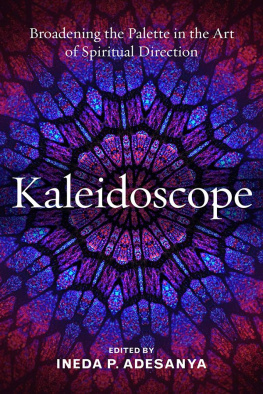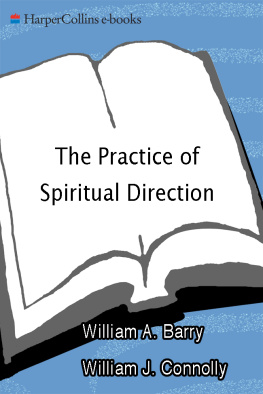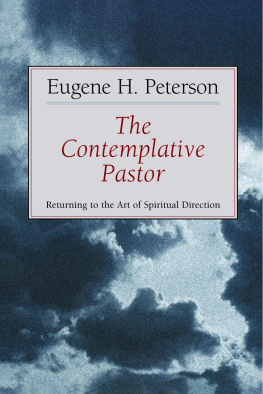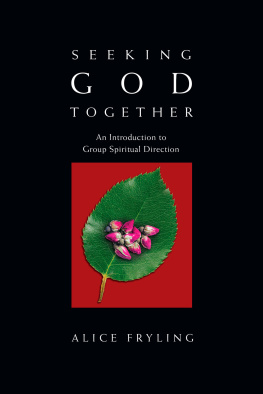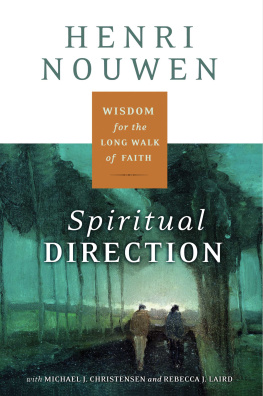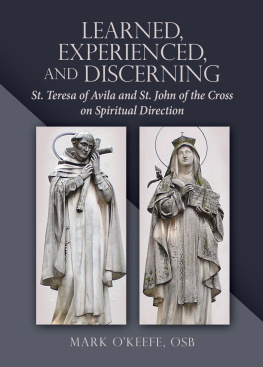1
The Ministry of Spiritual Direction
We are not aloneor, better put, we do not need to be alone and we are not meant to be alone, particularly when it comes to our attempts to make sense of Gods presence in our lives.
We each need to take personal responsibility for our own growth in faith, hope and love. A maturing Christian will desire to push deeper into studying Scripture and not expect to be spoon-fed Bible teaching. Likewise, each of us is called into a mature adult faith in Christ. We grow in confidence as we discern and make the key decisions that guide our lives.
And yet, while we each live the Christian life to which we are personally and individually called, we are not alone in this journey. We are part of the faith community; we have the joy of knowing others on the road who support us, encourage us, teach us, guide us and provide correction as necessary. Indeed, as we grow into an adult faith we learn, at each stage of the way, that we cannot make it on our own.
There is a certain irony here: the more mature we are in our faith, the more we recognize our need for otherscompanions, friends, pastors and spiritual directors. Each of these is a gift from God, a means by which we might appropriate Gods grace and respond to Gods call on our lives. Potentially, one of the more significant of these gifts is the ministry of spiritual direction.
The Ministry of Spiritual Direction
A spiritual director offers spiritual guidance and companionship to help us make sense of our faith journey, interpret with us the significant markers on the road, and encourage us, particularly through the more difficult transitions and valleys of our pilgrimage. Most of all, a spiritual director helps us make sense of the witness of the Spiritassisting us to respond well to the question, How is God present to me and how is God, through the ministry of the Spirit, at work in my life?
Even if we have been Christians and maturing in our faith for many years, we still need the encouragement and guidance that might come through spiritual direction. Only pride would lead us to think we could go it alone. Genuine humility is evident in our realization that we need a companion, a fellow pilgrim and Christian, who can help us discern and foster an attentiveness to Gods presence in our lives. This is the gift of spiritual direction.
Some might prefer that we use a different designation to describe this ministry. They suggest that the term director seems too authoritative or invasive, that the language of direction implies more actual direction than is appropriatefor only Christ is Lord and thus only Christ should actually direct. Many suggest that spiritual mentor might be a better designation, or perhaps spiritual companion or spiritual friend. As Simon Chan notes, there are some who resist the implied authority in the term director and prefer something more obviously egalitarian, something that connotes the other as one who comes alongside but does not actually direct.
I concur with Chans observation that the language of spiritual friendship suggests another kind of relationshipan equally important one, but a different ministry and relationship. As I will discuss in chapter two, the mentoring relationship is also a different grace in our lives. And while companion might be an appropriate way to speak of direction, the issue with each of these alternatives is the resistance to the idea of real authority in the life of the Christian believer.
To some degree, of course, the concern is legitimate. And yet spiritual direction is a tested and in a sense ancient designation. Further, all ministries, regardless of their namebe it pastor or apostle or evangelistare open to abuse and the imposition of one persons will on that of another. Changing a standard label does not remove that potential problem. But more specifically, the language of direction is so very appropriate in the sense that to direct is to be a companion with a very specific agenda: to help the other direct heart and mind to listen to the one most needed, Christ Jesus. We are like Eli who urgedindeed, directedthe young man Samuel to be attentive, to recognize the presence and voice of God and to respond appropriately. William Barry and William Connolly, in The Practice of Spiritual Direction, suggest that the language of direction implies that this conversation, in particular, is not casual, aimless or incidentally along the way, but focused and intentional.
Spiritual direction has a very clear agenda: directing our attention to the presence of God in our lives. The language of direction recalls for us the legitimate place of spiritual authority and accountability in our lives. But first and foremost, spiritual direction is the ministry of directing our thoughts and the movements of our hearts toward God and the presence of God in our lives.
A spiritual director urges us to focus our thoughtsto direct our heart and mindto God. This is typically and rightly done gently and perhaps by way of either question or suggestion. As a rule, we will not feel the force of the directors presence or intentions as much as the gracious nudging, the gentle urging that calls our attention back to God. A director might ask, Where do you sense the presence of God in your life at this time? or perhaps offer a suggestion: As I listen to you, I wonder if it might not be good to consider the following course of action. In either instance, the intent is the same: through question or suggestion this companion is directing our attention to the presence of God in our lives.
We need this. Perhaps it is too much to say that the ministry of spiritual direction is indispensable in our lives. And yet, for many of us it is invaluable. It is a vital dimension of the way in which pastoral care and formation equip us for our lives and our work, fostering our capacity for prayer and the deepening of our faith. And many are coming to see direction as an essential element of pastoral ministry. Both ordained and lay leaders in the church will find that many members of the congregation would benefit from this ministry if and as it is available.








